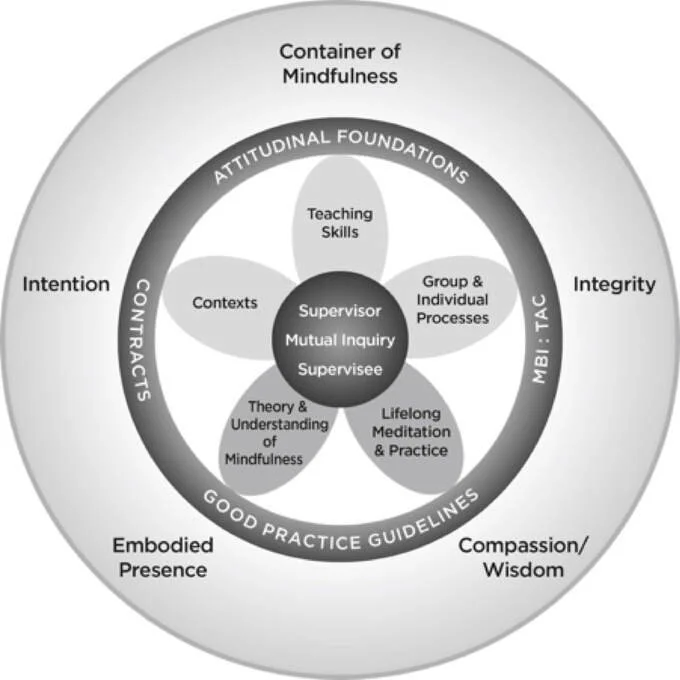It is the responsibility of each mindfulness teacher to organise their own supervision, in the way that is appropriate and beneficial in developing their teaching practice. The guidelines below will help teachers to choose the right supervision for them.
The supervisor will give a Working Agreement document to the supervisee, which will be filled in to decide and agree the terms of the supervision. This document will serve as a statement of Intention and Motivation for the shared supervision process.
The use of the word supervision in this context is intended to convey a collaborative partnership. The intention is to create an alliance between the supervisor and supervisee which enables open and creative exploration of personal practice, how this interweaves with teaching practice and the integration of mindfulness in work.
Supervisors do not have authority over the teaching practice of the supervised teacher. However the supervisor has a responsibility to communicate with their supervisee about any concerns they may have regarding the safety of those being taught. On rare occasions it may be appropriate for the supervisor to communicate concerns about safety to another responsible person (see details below).
The UK Network for Mindfulness-Based Teachers has the following requirements for supervision. Teachers are expected to meet these guidelines.
‘Engagement in processes which continue to develop mindfulness-based teaching practice:
- ongoing contacts with other mindfulness practitioners and teachers, built and maintained as a means to share experiences and learn collaboratively; and
- regular supervision with an experienced mindfulness-based teacher including:
i. opportunity to reflect on/inquire into personal process in relation to personal mindfulness practice and mindfulness-based teaching practice; and
ii. receiving periodic feedback on teaching through video recordings, supervisor sitting in on teaching sessions or co-teaching with reciprocal feedback’.
And from the FAQs document which accompanies the UK Guidelines:
What does ‘regular supervision with an experienced mindfulness-based teacher’ mean?
The regularity, length and type of supervision should be negotiated with a
more experienced supervisor with reference to the extent of teaching work being undertaken, the level of experience of teacher, and the requirements of the agency.
As a general guide, an inexperienced teacher might agree to use a minimum of three hours supervision over the period of an eight week course. It is recommended that experienced teachers who teach regularly should have mindfulness supervision at least monthly during the periods that they are teaching.
Peer supervision should be supplemented by having a named supervisor who has a role in monitoring quality.
(from Evans et al: A Framework for Supervision for Mindfulness- Based Teachers: a Space for Embodied Mutual Inquiry, 2014).
(see http://mindfulnessteachersuk.org.uk/GPG-FAQs.html)
What to expect from supervision
A supervision session is a mindful conversation around the personal practice and teaching practice of the supervisee. Issues, experiences and ideas are explored mindfully, without judgement and without a need to fix. The supervisor may offer some advice as well as facilitating mindful inquiry, depending on the needs of the supervisee. This mindful conversation is based on the principles of mindful dialogue, including regular pauses and trusting emergence.
The content of the sessions will be usually determined by what each supervisee brings. The supervisee will, therefore, be responsible for choosing what material to bring and will also be responsible for what learning they take from the supervision and how that learning is applied. The supervisor will be responsible for offering facilitation, guidance and support and will periodically refer to the requirements in
the UK Guidelines for Mindfulness-Based Teachers (for example asking the supervisee about CPD and any retreats they may have planned).
Supervisors will provide supervisees with an opportunity (usually over email) at
regular intervals to give feedback on the supervision as they experience it.Supervision sessions are not clinical supervision, personal counselling or therapy.
Feedback on teaching through live contact or video is part of having mindfulness
supervision.Mindfulness supervision may be held one to one or in a group.
Once supervision has begun it is recommended to maintain regular supervision
sessions even when the supervisee is not actively teaching, the minimum being bi- monthly supervision.
One to one Supervision
One to one supervision can be arranged according to the supervisee’s needs. A standard agreement might be 60 minutes monthly, however the supervisee may need more frequent supervision if they are new to teaching, especially when delivering their first course. They may also wish to have longer sessions if they teach mindfulness frequently. Zoom will be used for distance supervision.
Teaching Feedback
In the first year of supervision with a new supervisor, the supervisor should witness and givefeedback on their supervisee’s teaching. Supervisors will arrange with their supervisees (both one to one and group supervisees), an opportunity for co-teaching and supervisor feedback or use of a video for feedback. In subsequent years teaching feedback from the supervisor is optional (though recommended). After the first year supervisees may opt to engage in peer feedback with existing colleagues as well as or instead of supervisor feedback.
Option 1 – to ask the supervisor to attend a session taught by the supervisee
and then give feedback as above.
Option 2 – the supervisee arranges to film a teaching session for the supervisor to watch (with the video camera facing the supervisee not the group). The film will be approximately 1 hour’s duration. Feedback will be given as above.
The supervisee should use the Videoing Consent Form (which can be provided upon request) to gain consent from their group for this and should ensure that they are doing this in line with any existing policies provided by the organisation in which they are working. Video recordings can only bemade at the supervisee’s own risk. The supervisee will be wholly responsibleat all times for the creation and use of such recordings. I cannot accept any liability for any loss or damage that arises as a result of the making or use of any such recordings.
Confidentiality
Discussions in supervision sessions will normally be held in complete confidence. However supervisors may take aspects of the supervision experience to their own confidential supervision and if they do, will make every effort to maintain the anonymity of their supervisee.
If the supervisor has concerns about any matter arising from supervision which has or could have serious ethical, medico-legal, criminal and/or fitness to practice implications, they may need to discuss the matter with another responsible person. In those circumstances it may not be possible for the supervisor to keep all information confidential. However, supervisors will try to disclose only as much information as is necessary to consider their concerns properly with the other responsible person. A supervisor will go straight to another responsible person if the disclosure may affect the safety of another.
Data Protection
I may keep process notes of the supervision sessions as a reminder of what was discussed. These will also be kept in confidence and eventually destroyed.
Mindfulness Teachers Supervision
Mindfulness Supervision Resources





